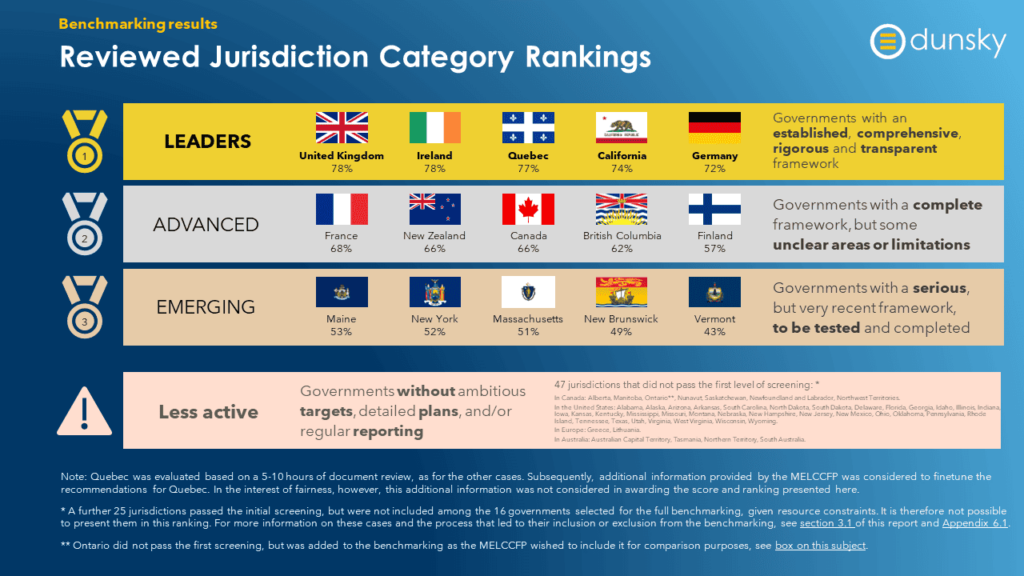Comparative Analysis of Climate Action Governance Frameworks

“Governance”. It may not be glamorous. Yet, to effectively tackle climate change, a strong governance framework can make all the difference.
A new study by our firm assesses the performance of climate governance frameworks across 88 national and regional governments and evaluates 16 leaders among them in greater depth. Our analysis, which included a review of 39 individual indicators, makes it possible to:
- Rank the governments among themselves and,
- Help identify the strengths and opportunities for improvement that would enable each to do even better.
Of note, the study does not assess specific climate policies, but focuses on the governance framework that surrounds them. Specifically, we assessed how governments set climate targets, how detailed their action plans are, how they model anticipated emissions reductions, how and when then they report on progress, and whether they have set up processes to course-correct when gaps emerge.
The study was developed for the Quebec Ministry of the Environment and the Fight Against Climate Change.
This report was originally written in French: the original document is available here. The report below constitutes a courtesy translation by Dunsky, to facilitate its dissemination to anglophone audiences. It is not an official or professional translation.
Takeaways
An exercise of this nature can never be perfect – we used publicly available data, made certain subjective decisions around criteria selection and weighting (with sensitivity analysis for added confidence), and added caveats where necessary.
Yet, after comparing and analyzing how governments set targets, model reductions, track progress, and adjust their plans, certain trends stood out. These included:
- Climate policy is complex: Climate policy involves mitigating four cascading gaps: an ambition gap, a planning gap, a delivery gap, and an impact gap. Managing all four gaps requires a comprehensive, rigorous governance framework. Governments struggle to simultaneously manage all four risks, as different approaches present trade-offs. These risks and trade-offs are further explained in the report.
- Governance pays off: Climate governance frameworks – including plans, reporting, independent advisory councils, and more – can drive results. In addition to keeping governments on track, they have enabled public debate and led to concrete improvements. While increased rigour, transparency and clarity won’t guarantee success, they definitely improve a government’s chances.
- Good governance is good politics: While good climate governance aims for emissions reductions, it also aims for – and must be anchored in – legitimacy. Without legitimacy from the public, governance will not have political support and likely be doomed to fail. A transparent approach, as well as building public consultations and equity into framework, can increase legitimacy. Moreover, it serves to address head-on the distribution of costs and benefits of the large societal and economic transformations implied by decarbonization.
Results and rankings
Below is a graph that tell the high-level story of how each of the leading jurisdictions scored across the categories.
Overall, our assessment suggests the United Kingdom (UK) has the most robust framework, which may be due in part to the age of the framework. Established in 2008, the UK’s carbon budget framework is one of the world’s longest running and has likely benefited from being improved upon and revised over time. Four other jurisdictions with rather different approaches – Ireland, Québec, California, and Germany – complete our leadership group. This showcases that different governance styles can, each in their own way, satisfy the requirements of rigor and transparency. Even so, none can rest on their laurels, as climate action to 2030 and beyond remains a long and complex road.

About Dunsky Energy + Climate Advisors
Dunsky supports leading governments, utilities, corporations and others across North America in their efforts to accelerate the clean energy transition, effectively and responsibly. With deep expertise across the Buildings, Mobility, Industry and Energy supply sectors, our team of 50+ professionals supports clients in two ways: through rigorous Analysis (of technical, economic and market).
Related Projects
- Read more about A New Tool to Help Home and Business Owners Electrify Their Heating
A New Tool to Help Home and Business Owners Electrify Their Heating
May 6, 2025
Today marks the launch of Chauffermieux.com, a website aimed at homeowners, renters and business in the Greater Montréal area to…

- Read more about Utility Projects on the Go
Utility Projects on the Go
October 18, 2024
Our team is currently supporting utilities on both coasts (and others in between) with a variety of strategic initiatives. Here…

- Read more about Canada Electricity Advisory Council Delivers Final Report on Achieving Canada’s Clean Electricity Goals
Canada Electricity Advisory Council Delivers Final Report on Achieving Canada’s Clean Electricity Goals
June 17, 2024
The Canada Electricity Advisory Council (CEAC), chaired by Dunsky President Philippe Dunsky, completed its 12-month mandate to examine ways in…
